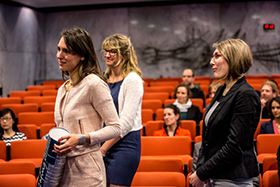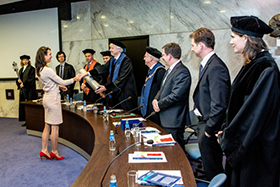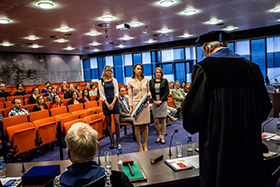PhD Defence: Social Context Effects on Decision-Making, A Neurobiological Approach
Social Context Effects on Decision-Making: A Neurobiological Approach
 Can neuroscience inform public policy? In her PhD thesis entitled <link doctoral-programme phd-in-management phd-projects detail>Social Context Effects on Decision-Making: A Neurobiological Approach, Mirre Stallen explores how social contexts influence the neurobiological systems involved in social decision-making. She argues that a better understanding of these neurobiological mechanisms not only provides useful knowledge about the psychological and neural basis of our behaviour, but that this knowledge can also help to make effective policy decisions targeted at behavioural change.
Can neuroscience inform public policy? In her PhD thesis entitled <link doctoral-programme phd-in-management phd-projects detail>Social Context Effects on Decision-Making: A Neurobiological Approach, Mirre Stallen explores how social contexts influence the neurobiological systems involved in social decision-making. She argues that a better understanding of these neurobiological mechanisms not only provides useful knowledge about the psychological and neural basis of our behaviour, but that this knowledge can also help to make effective policy decisions targeted at behavioural change.
Stallen finds that conformity to groups is mediated by the ability to take the perspective of another person, as well as by signals in the brain related to the valuation of rewards. The hormone oxytocin also appears to play an important role in conformity behaviour. People who received a nasal spray containing oxytocin were more likely to conform to the opinion of in-group members than those who received a placebo. Stallen explains that knowledge of the neural systems underlying in-group influence, such as smoking due to peer pressure, can be used to design policy interventions that promote behavioural change.
Other parts of the thesis examine the neural processes underlying celebrity endorsements, and explore the role of oxytocin in social norm violations. In addition, the dissertation reviewed cutting-edge neuroeconomic research, in particular the neurobiology of cooperation. Stallen concludes that more research on this topic may help develop policy strategies related to co-operative behaviours, such as waste recycling or the reduction of illegal music downloads.
 This dissertation took an interdisciplinary approach, combining methods and insights from Psychology, Marketing, Economics, and Neuroscience. Behavioural responses were collected and used in combination with both functional magnetic resonance imaging (fMRI) techniques and pharmacological interventions, examining the role of the hormone oxytocin in decision-making.
This dissertation took an interdisciplinary approach, combining methods and insights from Psychology, Marketing, Economics, and Neuroscience. Behavioural responses were collected and used in combination with both functional magnetic resonance imaging (fMRI) techniques and pharmacological interventions, examining the role of the hormone oxytocin in decision-making.
Mirre Stallen’s dissertation was defended on 24 May 2013. Her supervisor was <link people ale-smidts>Ale Smidts, Professor of Marketing Research. Her co-supervisor was Dr Alan Sanfey (Radboud University Nijmegen). Other members of the Doctoral Committee were Professor Ingmar Franken and <link people stefano-puntoni>Dr Stefano Puntoni (both of Erasmus University Rotterdam), Professor Karin Roelofs (Radboud University Nijmegen), Dr James Rilling (Emory University, Georgia, USA), and Professor Carsten de Dreu (University of Amsterdam).
About Mirre Stallen
Mirre Stallen (the Netherlands, 1981) graduated from secondary school in 1999. After a year of travelling she began her academic studies at the University of Amsterdam. As an undergraduate she studied Cultural Anthropology for a year and then combined a Bachelor’s in Biomedical Science with a minor in Psychology, receiving her degree cum laude in 2004. She continued her education with a Master’s in Cognitive Science, completed in conjunction with a six-month internship at the laboratory of Dr Jennifer Beer (University of California, Davis). She received her Master’s degree cum laude in 2006, and then worked for one year as a research assistant in the laboratory of Professor Richard Ridderinkhof at the University of Amsterdam. In 2007, Mirre began her PhD studies, which have focused on research in the
field of decision neuroscience under the supervision of Prof. Ale Smidts. The interdisciplinary nature of her project has also involved extensive collaboration with Professor Guillén Fernandez and Dr Alan
Sanfey at the Donders Institute for Brain, Cognition and Behaviour, Radboud University Nijmegen.
Stallen’s research has been published in  several peer-reviewed journals, such as Psychological Science and The Neuroscientist, and has been featured widely in national and international media. She has also presented her work at various international academic conferences, including the annual meetings of the Society for Neuroeconomics and the Social and Affective Neuroscience Society. She currently works as a post-doctoral researcher in the laboratory of Dr Alan Sanfey at the Donders Institute, where her research exploresthe psychological and neural processes involved in social co-operation.
several peer-reviewed journals, such as Psychological Science and The Neuroscientist, and has been featured widely in national and international media. She has also presented her work at various international academic conferences, including the annual meetings of the Society for Neuroeconomics and the Social and Affective Neuroscience Society. She currently works as a post-doctoral researcher in the laboratory of Dr Alan Sanfey at the Donders Institute, where her research exploresthe psychological and neural processes involved in social co-operation.
Abstract of Social Context Effects on Decision-Making: A Neurobiological Approach
This thesis explores how social context influences the neurobiological processes underlying decision-making. To this end, this research takes an interdisciplinary approach, combining methods and insights from Psychology, Marketing, Economics, and Neuroscience. In particular, behavioural responses are collected, and used in combination with both functional magnetic resonance imaging (fMRI) techniques and pharmacological interventions examining the role of the hormone oxytocin in decision-making.
The first part of the dissertation is concerned with the effects of social influence on decision-making, or in other words, how human decisions are influenced by the behaviour and beliefs of other people. Specifically, this part examines the influence of both celebrity endorsements and peer groups on the neural processes underlying decision-making. The second part of this thesis investigates the influence of social norms on decision-making. This section examines the neural processes involved in cooperation and the role of oxytocin in social norm enforcement.
- <link doctoral-programme phd-in-management phd-projects detail>Download Mirre's dissertation
- View photos of her defence
Photos: Chris Gorzeman / Capital Images

